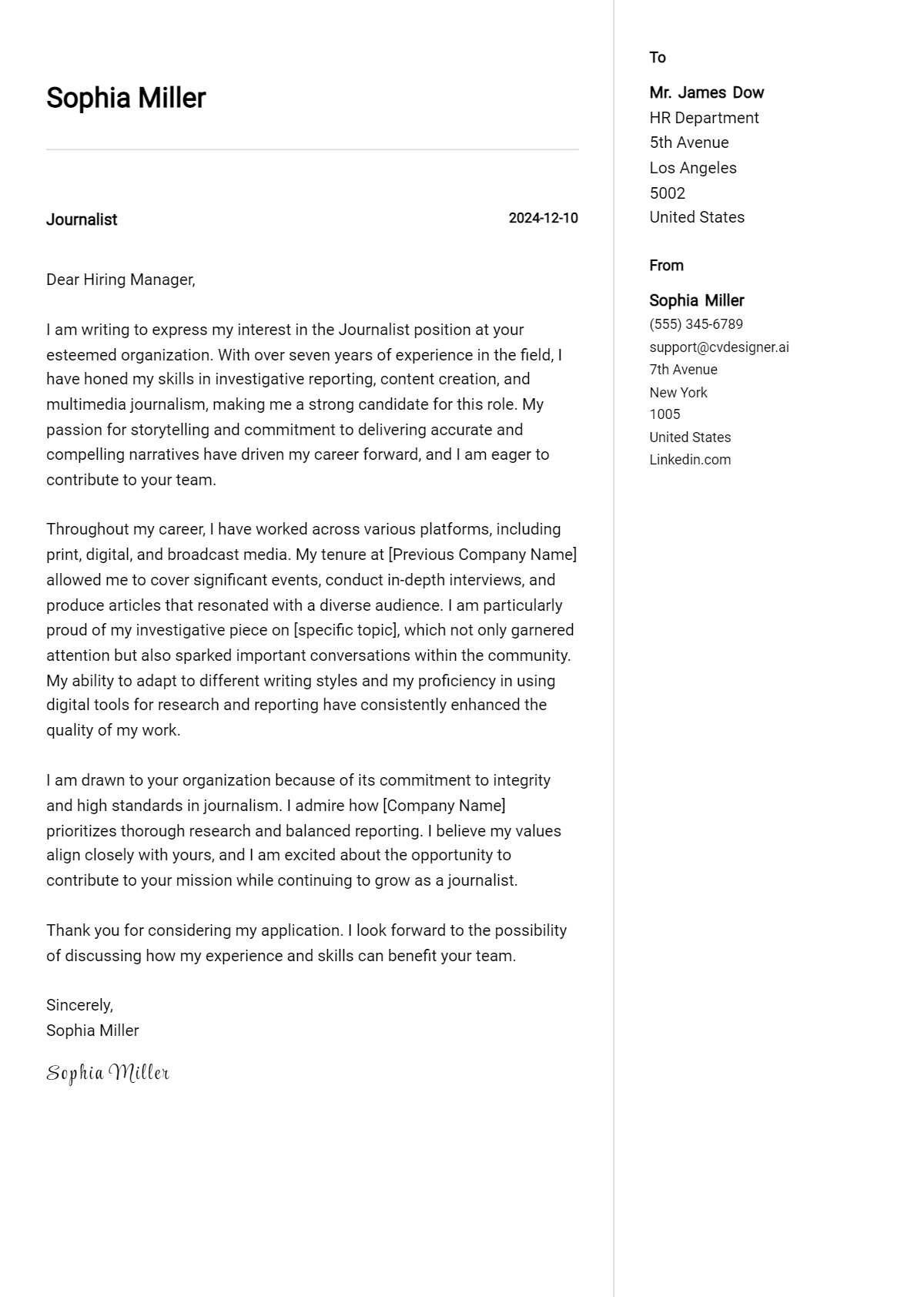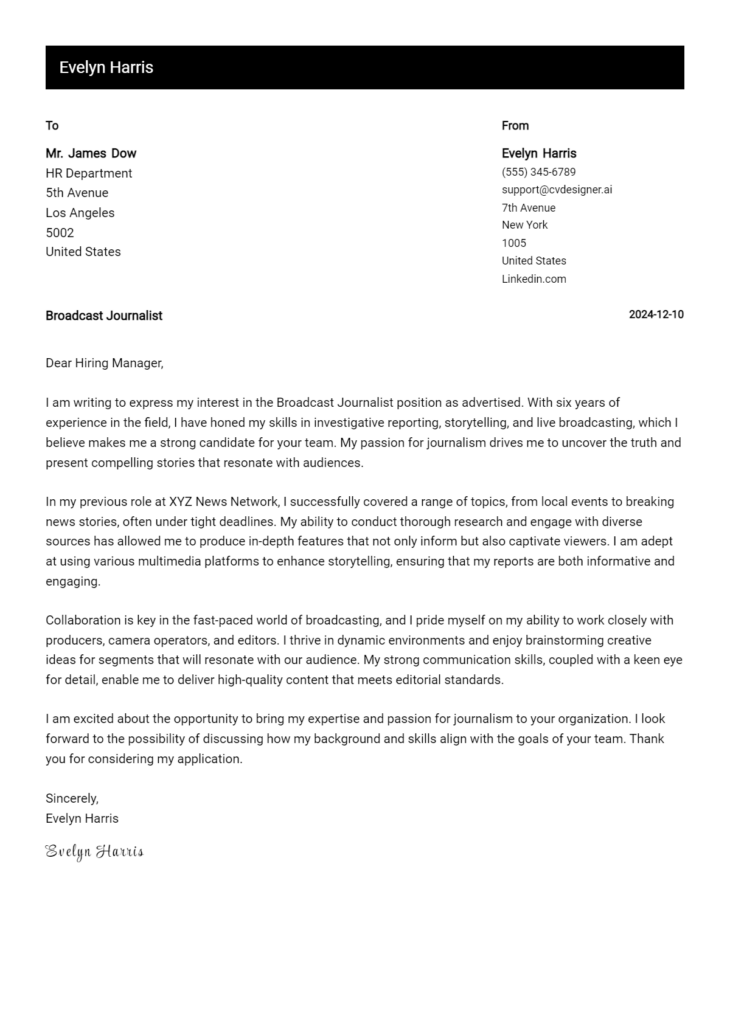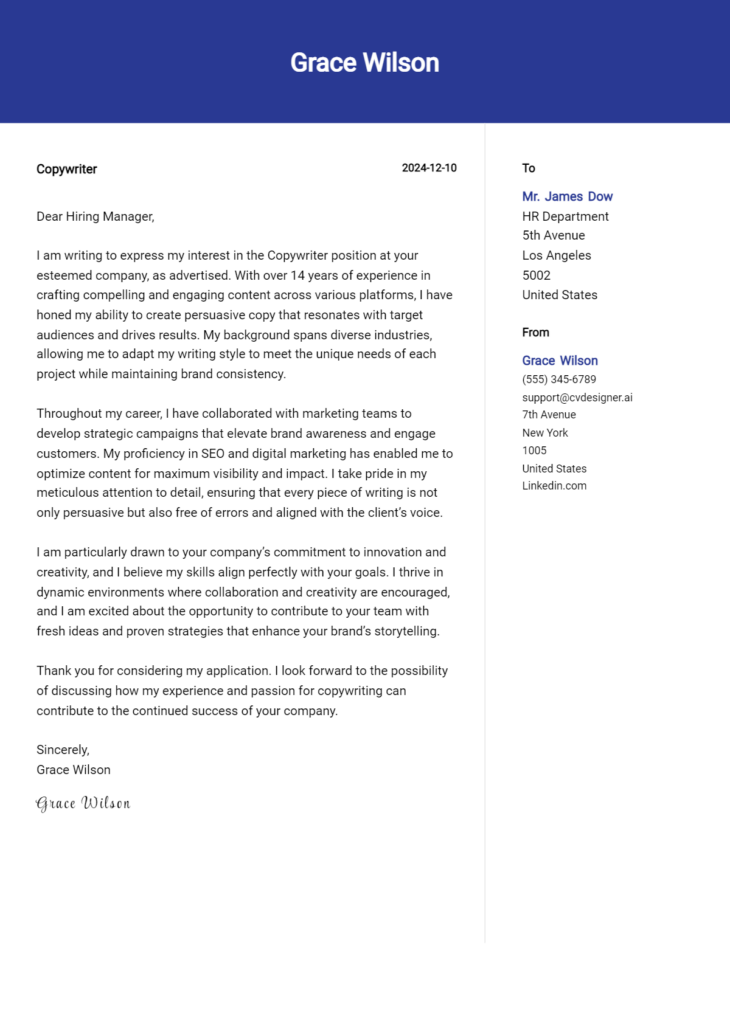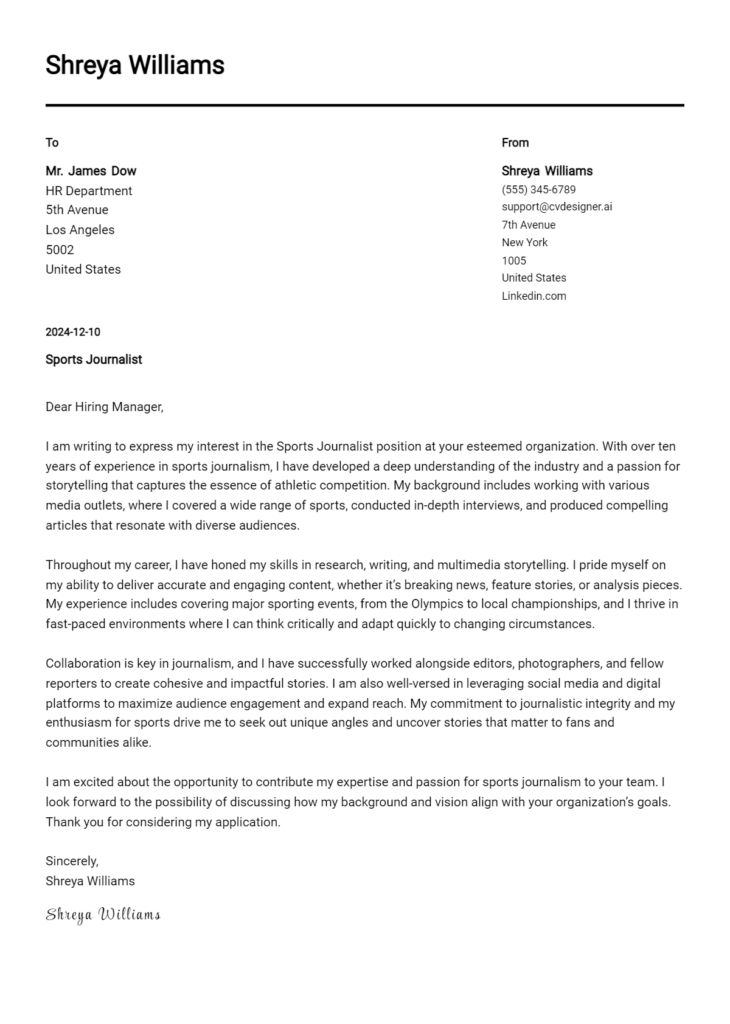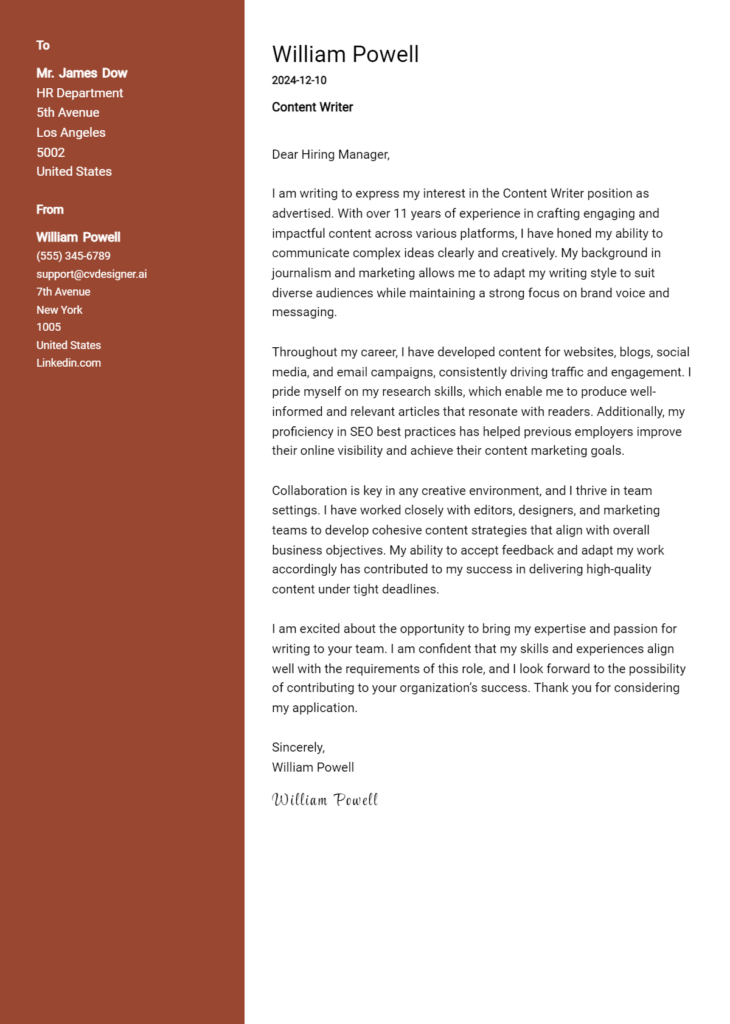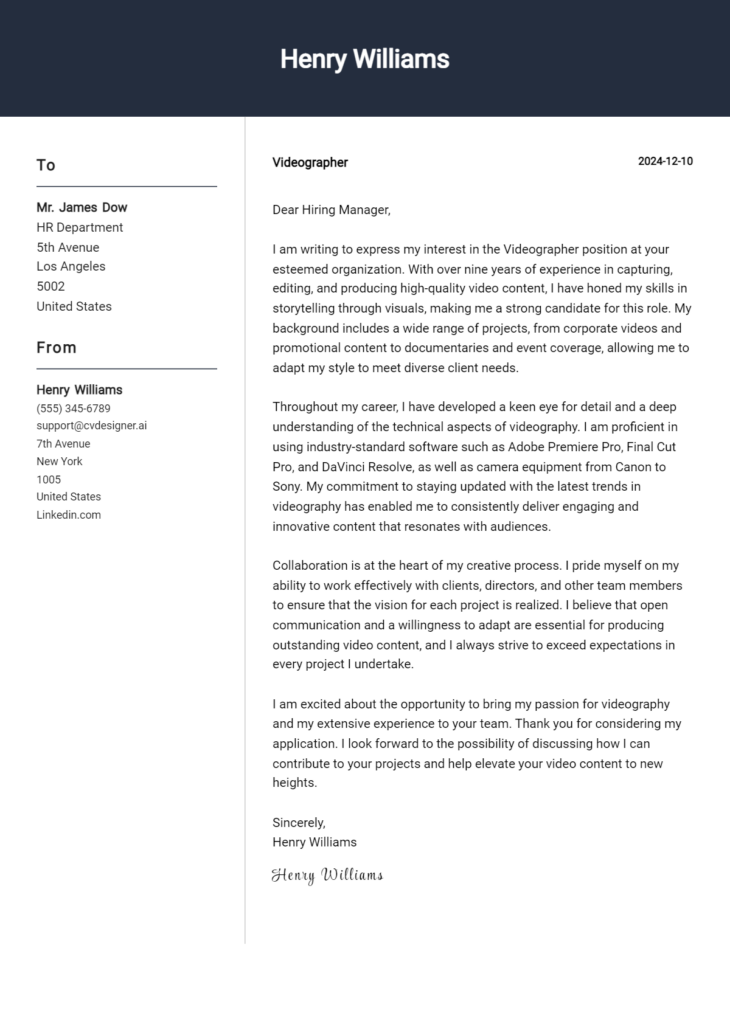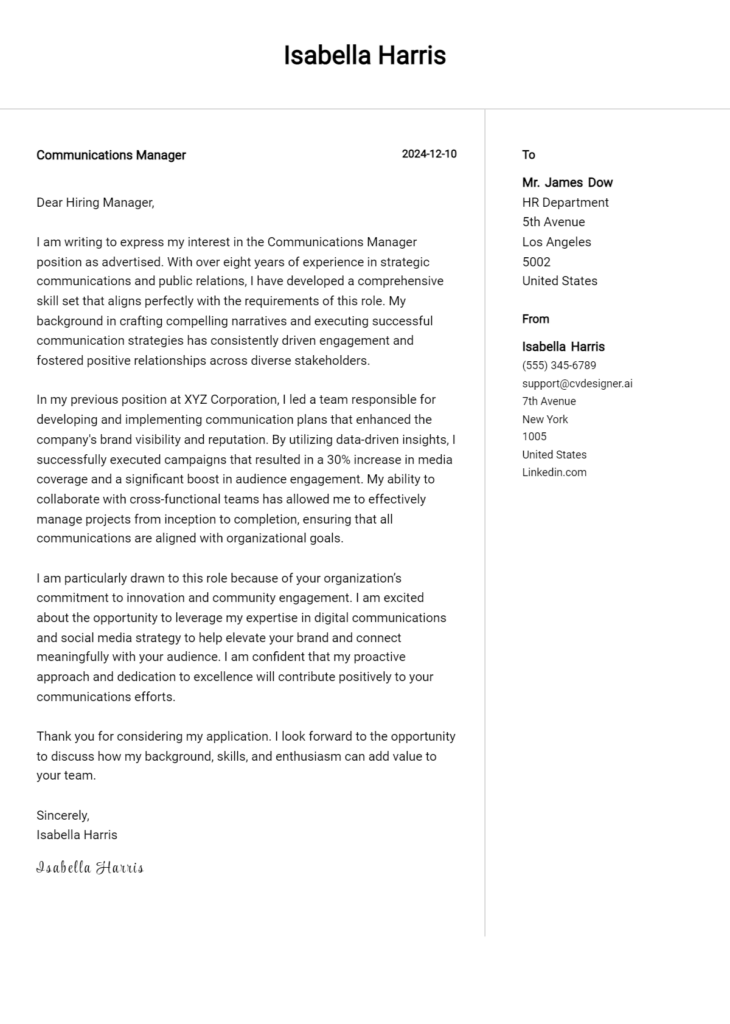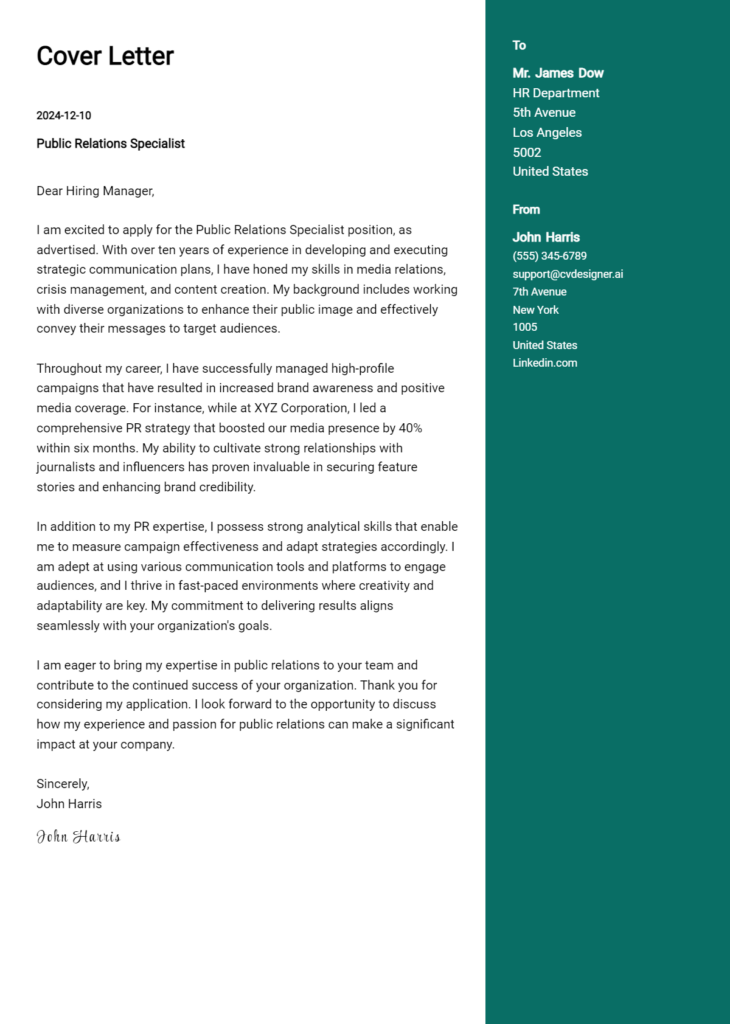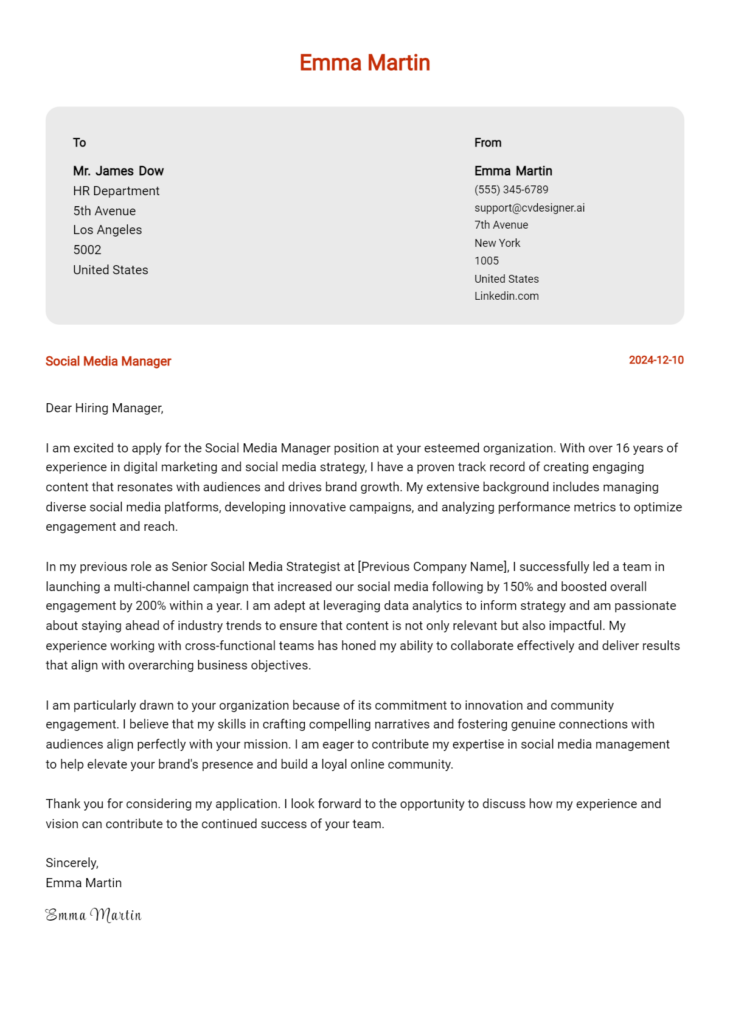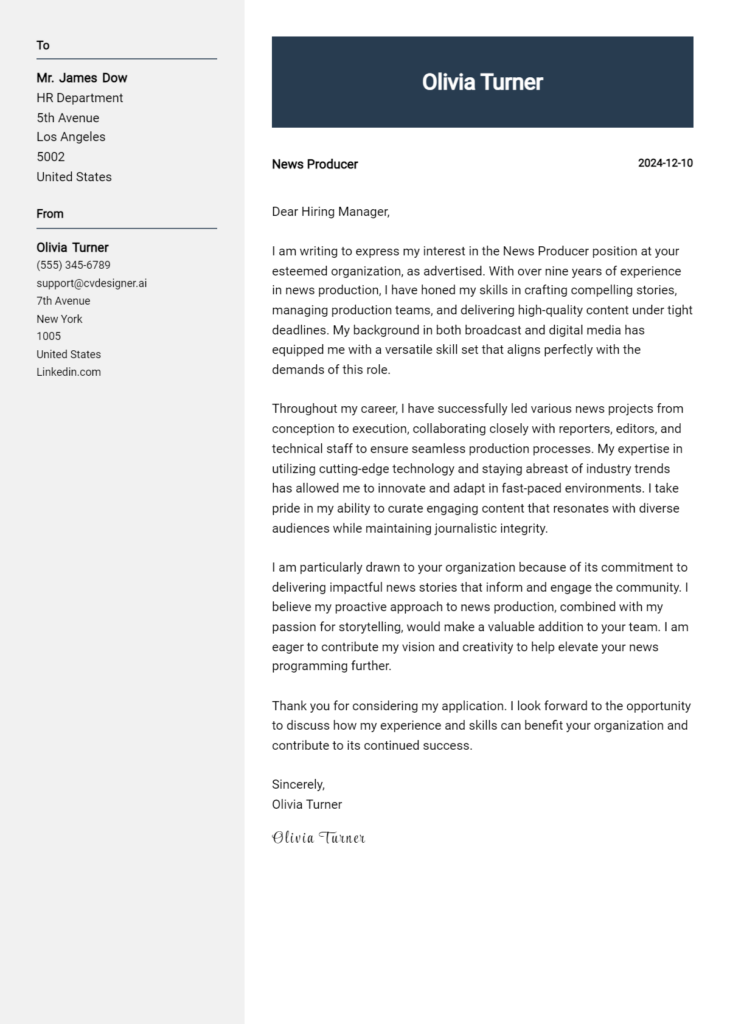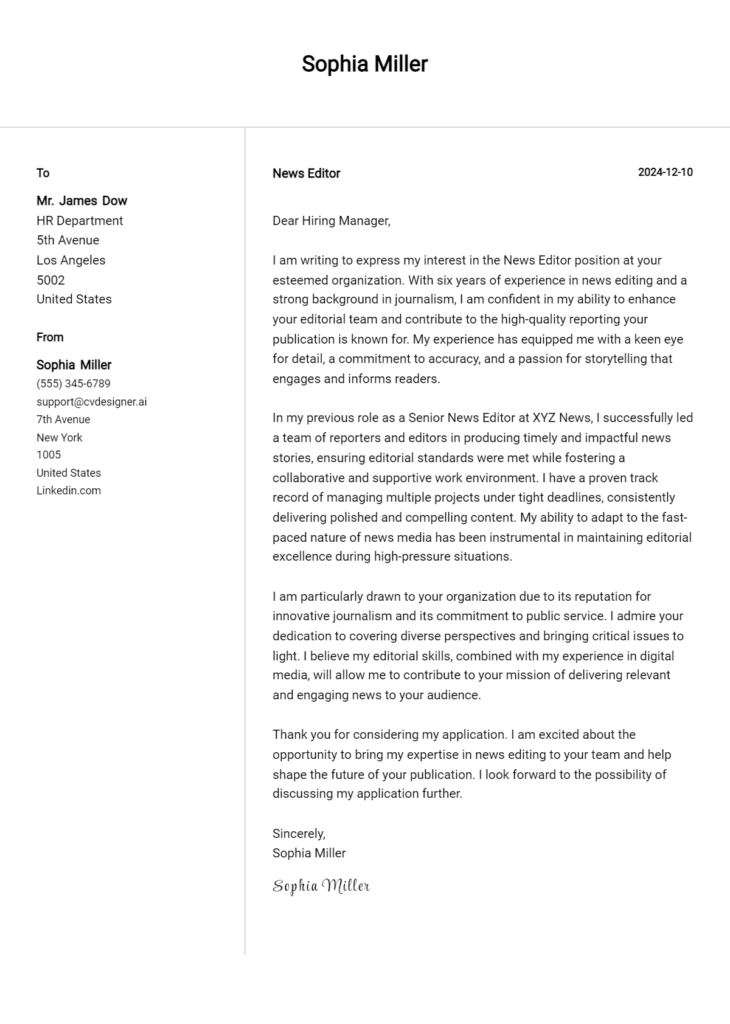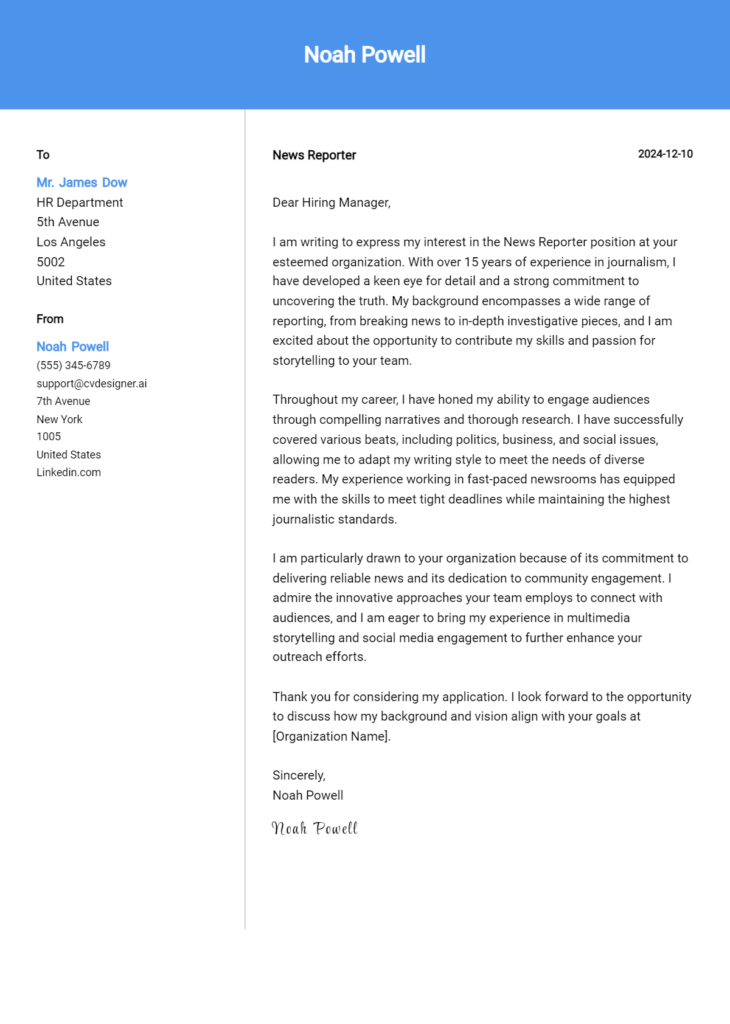Journalist Cover Letter Examples
Explore additional Journalist cover letter samples and guides and see what works for your level of experience or role.
How to Format a Journalist Cover Letter?
In the competitive field of journalism, a well-structured cover letter is essential for making a strong first impression. Your cover letter is not just a formality; it serves as a reflection of your writing skills, creativity, and ability to communicate effectively—qualities that are vital for any journalist. A thoughtfully formatted cover letter helps you stand out from the crowd, conveying your passion for storytelling and your understanding of the nuances of the industry.
In this guide, we will outline how to structure your cover letter, providing valuable insights and journalism-specific examples to help you craft a persuasive document.
We'll focus on the essential components of a professional cover letter, including:
- Cover Letter Header
- Cover Letter Greeting
- Cover Letter Introduction
- Cover Letter Body
- Cover Letter Closing
Each section is crucial for showcasing your qualifications and professionalism. Let’s break down each part and explain how to make your journalist cover letter shine.
The Importance of a Cover Letter Header for a Journalist
A well-crafted cover letter header is crucial for journalists, as it sets the tone for professionalism and clarity right from the start. The header should include essential contact information, the date, and the recipient's details to ensure that your application is both organized and easy to navigate. Clear presentation in the header reflects your attention to detail—an essential trait for any journalist. A strong header helps make a positive first impression, while a poorly formatted one can lead to confusion or a lack of credibility.
Strong Example
Jane Doe 123 Main Street Cityville, ST 12345 janedoe@email.com (123) 456-7890 October 1, 2023 Mr. John Smith Editor-in-Chief The Daily News 456 Elm Street Townsville, ST 67890
Weak Example
jane doe email: janedoe@email.com october 1, 2023 editor the daily news
The Importance of the Cover Letter Greeting for Journalists
The greeting of your cover letter is a critical element that sets the tone for the rest of your application. It serves as your first impression and can significantly influence how the hiring manager perceives your professionalism and enthusiasm for the role. By addressing the hiring manager directly, you create a sense of personalization that shows you’ve taken the time to research and engage with the company. Avoiding generic greetings such as "To Whom It May Concern" not only reflects your attention to detail but also demonstrates your genuine interest in the position. If you are unable to find the hiring manager's name, a little effort in research can go a long way in establishing a connection.
Strong Greeting Example
Dear Ms. Johnson,
Weak Greeting Example
To Whom It May Concern,
The Importance of a Well-Crafted Cover Letter Introduction for a Journalist
A well-crafted cover letter introduction is crucial for a journalist seeking to make a lasting impression on a hiring manager. This initial paragraph serves as your first opportunity to capture attention, express enthusiasm for the role, and highlight key skills or achievements that set you apart from other candidates. A compelling introduction not only draws the reader in but also sets the tone for the rest of the cover letter, making it evident that you are a serious contender for the position. Below, I present both strong and weak examples of cover letter introductions tailored for a journalist role.
Strong Example:
Dear [Hiring Manager's Name], As an award-winning journalist with over six years of experience in investigative reporting, I am excited to apply for the position at [Company Name]. My passion for uncovering the truth and telling impactful stories has driven me to pursue challenging assignments that have not only enhanced my skills in research and writing but have also garnered national recognition. I am eager to bring my expertise in multimedia storytelling and my commitment to journalistic integrity to your esteemed team.
Weak Example:
Hi there, I saw your job posting for a journalist, and I think I might be a good fit. I have some experience in writing articles and stuff, and I'm really interested in journalism. I hope you consider my application, even though I haven't worked in this exact field for long.
Purpose of the Cover Letter Body for a Journalist
The body of a cover letter for a journalist serves as a critical component in presenting the candidate's skills, experiences, and overall value to the prospective employer. It allows the journalist to highlight specific projects or accomplishments that demonstrate their writing ability, investigative skills, and adaptability in various media formats. By detailing past experiences, such as award-winning articles, successful interviews, or impactful investigative pieces, the candidate can effectively convey their unique voice and journalistic integrity, which are essential for standing out in a competitive field.
Strong Example
As a journalist with over five years of experience at XYZ News, I have honed my skills in investigative reporting and feature writing. One of my most notable projects involved uncovering a local government scandal, which led to significant policy changes and earned me the 2022 Investigative Journalism Award. Additionally, my article on climate change impacts in our community not only resonated with readers but also sparked discussions at the town hall meeting. My ability to engage with diverse sources and present complex information in an accessible manner will be an asset to your team at ABC Media.
Weak Example
I have worked as a journalist for a few years and have done some articles. I think I am a good writer and can cover different topics. I have written about many things, but I don’t have any awards or significant achievements. I hope to do well in your company because I am eager to learn and improve my skills.
Importance of the Cover Letter Closing for a Journalist
The closing of a cover letter is crucial for a journalist as it serves to summarize key qualifications, reaffirm enthusiasm for the position, and encourage the hiring manager to take the next step in the hiring process. A strong closing leaves a lasting impression, making it clear why you are the ideal candidate while inviting further discussion about your application. Conversely, a weak closing can diminish the impact of an otherwise compelling cover letter, failing to motivate the reader to consider you for an interview.
Strong Example
Thank you for considering my application for the journalist position at [Company Name]. With my extensive experience in investigative reporting and a passion for storytelling, I am excited about the opportunity to contribute to your team. I welcome the chance to discuss how my skills align with your needs and explore the potential for collaboration. I look forward to the opportunity to speak with you and am happy to provide any further information needed. Please find my resume attached for your review.
Weak Example
Thanks for reading my letter. I hope you think about my application. I guess you can look at my resume if you want. Anyway, let me know if you need anything.
Crafting an effective cover letter is crucial for journalists aiming to make a lasting impression in a competitive job market. A well-written cover letter not only highlights your technical skills and problem-solving abilities but also showcases your understanding of the Software Development Life Cycle (SDLC), your capacity for teamwork, and your passion for continuous learning. Below are some tips to help you create a compelling cover letter that stands out.
Tips for Writing a Journalist Cover Letter
Highlight Your Technical Skills
In today’s digital age, journalists must be proficient with various tools and technologies. Be sure to mention any experience you have with content management systems, data analysis tools, or multimedia production software. Discuss how these skills can enhance your reporting and storytelling abilities.Demonstrate Problem-Solving Abilities
Journalists often face unexpected challenges, from tight deadlines to complex story angles. Use specific examples to illustrate how you have successfully navigated obstacles in your previous roles. This could include managing a crisis during a live report or creatively sourcing information under pressure.Show Knowledge of the Software Development Life Cycle (SDLC)
Understanding the SDLC can be beneficial, especially for journalists working in tech-focused media. Mention any experience you have in collaborating with developers or utilizing project management tools. This knowledge can help you communicate effectively with tech teams and enhance the depth of your reporting.Emphasize Teamwork Skills
Journalism is rarely a solo endeavor. Highlight your ability to work collaboratively with editors, photographers, and fellow reporters. Share examples of successful team projects and how your contributions led to impactful stories. This demonstrates your capacity to thrive in a dynamic newsroom environment.Express Your Passion for Continuous Learning
The media landscape is constantly evolving, and a successful journalist must adapt. Discuss any recent courses, workshops, or training you have undertaken to stay current in your field. Your commitment to learning not only showcases your dedication but also positions you as a proactive candidate who is eager to grow and innovate.
By incorporating these elements into your cover letter, you can effectively communicate your qualifications and enthusiasm for the journalist role. For additional resources, consider exploring cover letter templates or using a cover letter builder to streamline your writing process.
Common Mistakes to Avoid in a Journalist Cover Letter
Crafting a compelling cover letter is essential for standing out in the competitive field of journalism. By steering clear of common pitfalls, you can significantly enhance your chances of making a strong impression. Here are some frequent mistakes to avoid, along with tips on how to sidestep them:
Using a Generic Template: Many applicants fail to customize their cover letters, leading to a lack of personal touch. Always tailor your letter to the specific publication and position you’re applying for.
Neglecting to Research the Publication: A common misstep is not demonstrating knowledge about the publication’s style and audience. Familiarize yourself with their recent articles and incorporate relevant insights into your cover letter.
Focusing Too Much on Qualifications: While it’s important to highlight your skills, avoid listing qualifications without context. Instead, connect your experiences to the publication’s needs and show how you can contribute.
Ignoring the Format: A poorly formatted cover letter can undermine your professionalism. Follow a clear structure and refer to cover letter format guidelines to ensure clarity and readability.
Failing to Proofread: Spelling and grammatical errors can be particularly damaging in journalism. Always proofread your letter multiple times, and consider asking a colleague for feedback.
Being Overly Casual: While a conversational tone can be engaging, avoid being too informal. Maintain a professional demeanor that reflects your seriousness about the role.
Not Including a Call to Action: Many applicants fail to conclude with a strong call to action. Express enthusiasm for the opportunity to discuss your application further, inviting the editor to reach out.
By being mindful of these common mistakes and implementing these tips, you can craft a more effective cover letter. For additional inspiration, check out some cover letter examples that can guide you in showcasing your unique voice and skills.
Cover Letter FAQs for Journalist
What should I include in my journalist cover letter?
In your journalist cover letter, start with a strong introduction that captures the hiring manager's attention. Mention the specific position you’re applying for and where you found the listing. Highlight your relevant experience, including specific articles or types of journalism you excel in, such as investigative reporting, feature writing, or digital journalism. Showcase your skills in research, storytelling, and any multimedia abilities you possess. Be sure to convey your passion for journalism and the publication's mission. Finally, conclude with a call to action, expressing your desire for an interview and your excitement about the opportunity to contribute to their team.
How long should my cover letter be?
Your cover letter should ideally be one page long, comprising three to four concise paragraphs. Aim for around 250-400 words to ensure it is thorough yet succinct. This length allows you to provide enough detail about your qualifications and enthusiasm for the role without overwhelming the reader. Keep your writing clear and focused; avoid unnecessary jargon or lengthy anecdotes. Remember, the goal is to entice the hiring manager to read your resume and consider you for the position, so every sentence should add value to your application.
How can I tailor my cover letter for a specific publication?
To tailor your cover letter for a specific publication, start by researching the outlet’s style, audience, and recent articles. Mention specific pieces that resonate with you and explain why they inspire you. Align your experience and skills with the publication's needs and values; for instance, if they focus on investigative journalism, highlight your relevant work in that area. Use the publication's tone and language to create a cohesive narrative. Including your understanding of their audience can further demonstrate your fit for the role. Personalizing your cover letter shows genuine interest and gives you an edge over generic applications.
Should I include links to my work in my cover letter?
Yes, including links to your previous work is highly recommended in a journalist's cover letter. This provides the hiring manager with immediate access to your writing samples, showcasing your skills and style. When including links, ensure they lead to a diverse range of your best work, such as articles, multimedia pieces, or blogs relevant to the position you're applying for. You can either hyperlink the text or list the URLs at the end of the letter. Just make sure to present them neatly and ensure they are functional. Presenting your work highlights your qualifications and offers tangible proof of your abilities.
Build your Cover Letter in minutes
Use an AI-powered cover letter builder and have your letter done in 5 minutes. Just select your template and our software will guide you through the process.

